
Crtd 06-09-18 Lastedit 15-10-27
Sese Islands
In Mwanza, a man called Dominic was said to have built a dhow bigger than mine and gone off with it to Uganda. On the way he got lost for a year. He turned out to have been blown on an island by a thunderstorm that also ruined the local village. Villagers and he were told to have worked for a year to repair houses and dhow, after which he continued to Uganda. At Entebbe, I heard that a Dominique was owner of the Sese island Banda, where he runs a kind of backpacker's camp. Our GPS calibrated maps displayed an island "Banda" 36 km off coast South of Entebbe. We left Entebbe at 4 AM, three hours before dawn, with the start of the North land wind, and sighted the island at eleven.

Photo: Day 10 on map: Dominic's Sese Island Banda, on the right his beach is visible. On the left end (not visible) is a squatter's village.
A mirror was intermittently reflecting the sun towards us from somewhere between the trees. With my binoculars I spotted the source: a man, clearly with white legs, sticking out of what appeared to be the last remains of some rags that in a distant past may have been recognised as a pair of trousers.
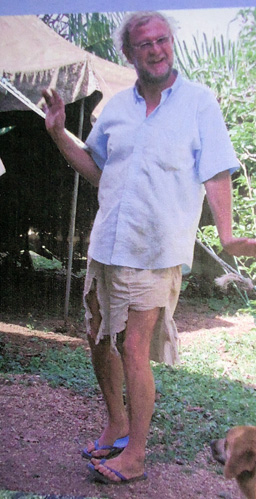
"Dominic I presume?", I asked after mooring at 150m and canoeing to the beach.
It was Dominic. His island is roughly 1600 by 800 m. He lives there for 15 years
now, after a life of "blowing up rocks" (mineral mining). The first 9 years he just lived there. No backpacker's camp yet. Some
Ugandan workers to do his garden, and not much else, he does his own cooking and
cleaning is not on the agenda, clothes nor anything else. Then, six years ago,
came the backpacker's camp. Guest money receipts started to be used to buy
cement for building walls with island stones. Little natural stone walls mushroomed but all have a decisive air of being unfinished, some for so long
that they now to look like old English ruins, lushly covered with rainforest
vegetation. Standing out is his own place, a three story, there is no better
word for it, castle. Its ground floor (small stones covered with some planks to
reach the stairs) uninhabited, but the second floor features some private
possessions and the third his bedroom. From this third floor, diehards can climb
a steep metal stairs to his roof platform overlooking all trees to this East and
South bay on the peninsula between which the castle is built.
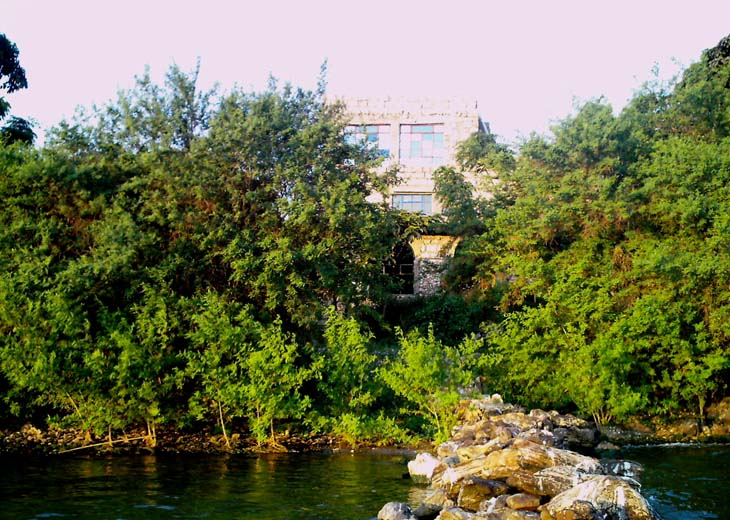
Photo: Dominic's three story castle with roof platform for sunset beers
"15 years! I thought I was a loner but you outdo me with
ease", I say to Dominic.
"Well, only just getting settled", is the reply.
Indeed there is a dhow too, and it is longer than mine. But not wider, we are
roughly equal in cubic meters. Another difference: mine floats.
Photo: Dominic's Dhow
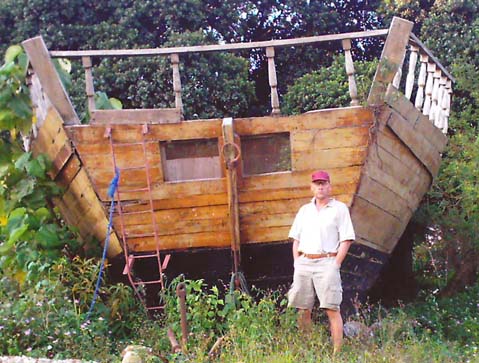
Photo: The dhow, yours truly posing to indicate the scale
I will not go in technical details, but clearly Dominic, like
me, got in the desperate stage where the dhow building headed for a huge
matchbox "crawling like a snake" (see my
![]() Dhow building logbook page
Despair and Depression),
but did not have the luck to find external advisers and contractors to fix that
fatal problem. His dhow really lacked stiffness: one strong perpendicular beam
instead of my three, none of the stiffeners and angle bar triangles I forced on
my contractor. That means a lot of movement in the joints on waves shocks and wind
bursts, disrupting the caulking and eventually leading to frame cracks. The
bullwork however, looked quite elegant.
Dhow building logbook page
Despair and Depression),
but did not have the luck to find external advisers and contractors to fix that
fatal problem. His dhow really lacked stiffness: one strong perpendicular beam
instead of my three, none of the stiffeners and angle bar triangles I forced on
my contractor. That means a lot of movement in the joints on waves shocks and wind
bursts, disrupting the caulking and eventually leading to frame cracks. The
bullwork however, looked quite elegant.
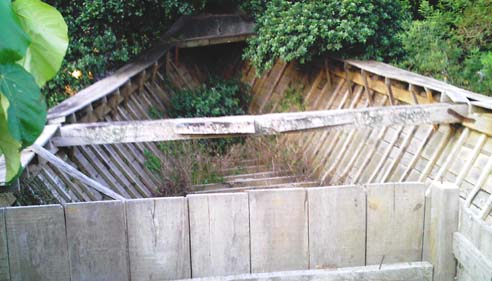
Photo: Dhow, now planned to become the Islands beach bar
Dominic's story of his dhow's fate was that running it to sail tourists was not economical. His version of his stranding on an island was that they just tore the sail in a mid-lake storm into disturbingly small pieces and repaired it there, which had taken a week only. But he confirmed that from Mwanza to Banda he had not followed the coast line but went straight through the middle on a pocket compass (map). Later I heard he had rented the dhow to Kenyans who had to strand the dhow because the leaking speed ran out of control. The deck is now off and forms floors and doors of his many houses in statu nascendi. He plans to start a cozy beach bar in what remains of the hull. Later I found on http://www.geocities.com/banda_island/dhow.html the following text:
Unfortunately the Dhow is currently out of the water getting a major refurbishment but we hope to get her back up and running in a few months look more beautiful and better equipped. We will post new information as soon as we get it.
No dhow sailing trauma's left though with Dominic. He was delighted to join us the next day, a good thing, because not only is he very cheerful and witty company, he also knew the whereabouts of the second item of our discovery list, a beach with lodges on Sese's main island Bugalla-Buninga. Somewhere near the main town Kalangala. His only two campers were persuaded to join, so no business left on Banda.
|
Later pages about Banda Island: |
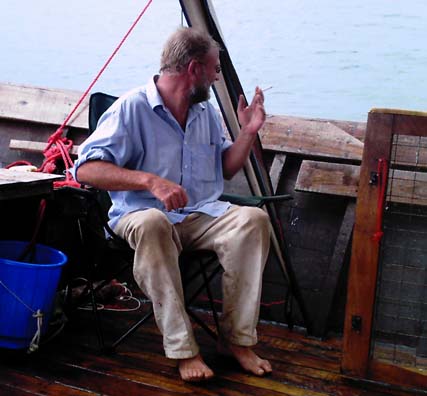
Photo: Dominic joining and enjoying our trip to Kalangala
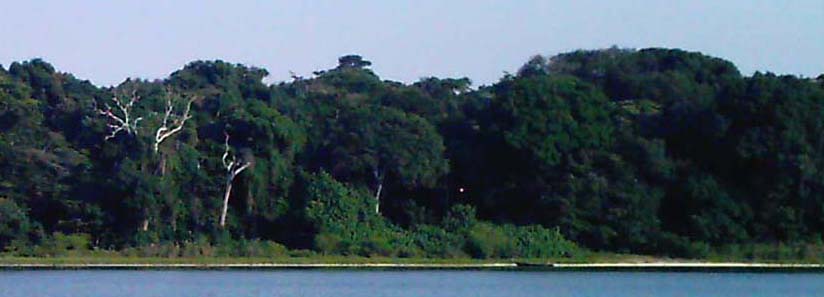
Photo: Sese's main island Bugalla-Buninga: quite some virgin island rain forest is left
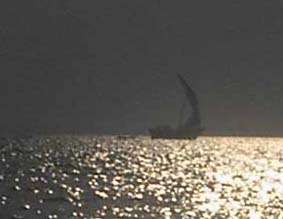
Photos: Dhow starting off at Kalangala for return to Dominic's island Banda (Photo Loek Verburg, Hornbill Camp, Kalangala)
After another visit to Dominic's Banda island on the way back we returned to Jinja. Our Kingfisher Lodge mooring there turns out by far the best of all mooring places we have seen thus far, though Dominic's South bay and the beach camp ran by Dutchman Loek Verburg, in his fifties, with his young Ugandan girlfriend are quite agreeable.
The main security threat on the lake, as in Tanzania, is police and local high politicians and government officers. Normal robbers (thus far) do not even dare to approach a boat of our size. At Ngamba, the chimpanzee orphanage, the staff had even been fearing us on our arrival. But officials have no qualms to get near us. They know they are not allowed to be shot on. Once Dominic had some cows on Banda. This awoke the greed of a local politician. After some discussions on payments, which Dominic appears to have refused, the man lost his patience. Armed police moored at Banda with a letter proving the cows were the politician's and took them to the main island. End of Banda cow breeding.
Waiting on anchor for a wind shift allowing us to head for
Banda, a military boat with three loaded machine guns in front approached us
slowly, hit us (that was purely nautical incompetence), then told us they were
hungry.
Sorry no food.
But they also liked beer, they told us.
Sorry, we do not drink alcohol, the same is advisable for soldiers handling
three loaded machine guns. Yes, we are even out of soda's.
SMS to Dominic: "Gunboat likes beer"
SMS from Dominic: "That's normal"
An hour later, an army helicopter flew half a meter over our mast (lower would have cost us a mast and them a helicopter). So far for showing disappointment. Heaven compared to Tanzania. (see surfboard). It was a good occasion for Philemon to tell some of his Tanzania lake crime stories (click here)
On the way back a canoe with big outboard started circling
around us, then went back. With his back turned to us, one African gaudily
lifted his gun from the floor pretending it needed some cleaning.
Thank you, we've seen it.
The next day we had something looking more like a regular police inspection (quite some guns and men for the case we would not comply). They, like all others before, did not mount the ship and made no attempts to annoy us - in exchange for the termination of which some money or beer would be expected. Government officer's discipline in Uganda is a relatively good to East African standards especially good compared to Tanzania.